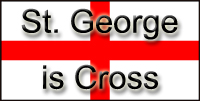Justice and Home Affairs
You may or may not have seen this topic in the news recently, but it's one UKIP were pushing pretty hard on. We did manage to get the Sun and the Telegraph to comment on it, but alas they did not mention UKIP. I guess it's all part of the plan not to highlight how desperately pathetic the Conservative Party are and not to weaken them by pointing out there is a party out there campaigning on the issues people care about...
At the end of the last Commission in 2004, an evaluation took place which highlighted major obstacles to 'progress'. One of these areas was the requirement on unanimity in the Council on Justice and Home Affairs.
The basic plan is to transfer criminal law and police cooperation from the 3rd pillar of the EU treaties into the 1st pillar. In English:
The first or ‘Community’ pillar contains the EU’s core policy areas such as the environment, single market and employment law.
The Third pillar covers “Provisions on Police and Judicial Co-operation in Criminal Matters.” Which was formerly known as the Justice and Home Affairs pillar before the transfer of policy on asylum, migration and judicial co-operation in civil matters to the Community pillar.
The plan is for a 'bridging clause' which, in the Commission's own words would, 'constitute a solution to overcome these difficulties in applying the 'Community method' to the policies in the area of freedom, justice and security.'
This would abolish the national veto and would massively increase the power of the European Commission and the European Court of Justice, the in-house court, who has as it's aim the supporting of an ever closer union.
The ECJ already has power to declare any national law which is inconsistent with a law of the EU invalid. Moving JHA into the community pillar could potentially widen the scope of the Commission's Competence to almost anything involving police and the judiciary. It means that if the EU legislates on anything to do with JHA it becomes a Community competence. On 13th September 2005 the ECJ gave the EU powers to set criminal penalties for the first time: a combination of these factors could prove explosive.
The UK govt. in May stated that they would not reject this. The House of Lords has warned of the 'creeping competence' of the Commission which this change could bring about.
Transferring Justice and Home Affairs issues into the first pillar would mean that all proposals to harmonise criminal law across the EU and matters of police cooperation would:
• Be agreed on by Qualified Majority Voting (QMV) in the Council of Ministers
• Come under the jurisdiction of the European Court of Justice which has until now had only a very restricted say on third pillar matters
• Gradually confer more power over criminal matters to the EU. Once the EU gains competence in a certain area the member states lose the right to propose new laws in that field of law
• Give the EU Commission the sole right to initiate legislation in these matters. By gaining a monopoly over the right to propose laws on criminal justice and police cooperation the EU Commission would enjoy greater power than it would have received from the EU Constitution under which it would have had to share the right to propose new laws.
With decisions being made by the Council of Ministers, it has already turned the British Constitution on its head, by allowing ministers - supposed 'servants' if one knows Latin these days - to dictate to Parliament. Now, even if a British minister votes against a proposal in the Council, he cannot put it out to pasture. Instead, the British Parliament would have to enact laws made by foreign ministers, unelected by the British public which were not supported by the British representative.
The loss of trial by jury would probably be the most visible alteration. Habeas Corpus is an alian concept to the European Justice System - who do not have to have evidence before they arrest people and can keep people locked up in prison without charge for weeks, as in the case of Chris Lees, who was locked up in a Spanish jail for 50 weeks with no case ever brought against him.
There already exists a miniature EU police force called the Euro Gendarmerie Force - made up of 5 countries. (Spain, France, Portugal, Italy and Belgium). They are military police who have as a logo the ring of stars with a sword and a flaming grenade inside. They are not controlled by their government - they are a supranational police force who recognise the EU as their authority.
For pretty pictures and the such, visit : www.Eurgendfor.org










No comments:
Post a Comment